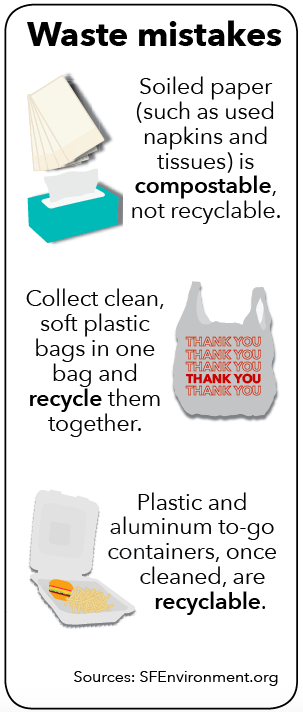School fined for improper sorting
Incorrect composting and recycling causes significant fines
As 2020 draws nearer and the timer for San Francisco’s goal to become a zero waste city ticks down, Recology, the city’s waste management company is cracking down on trash sorting by fining many residents, businesses, and institutions — including Convent & Stuart Hall.
“It’s not uncommon for our school to be charged between five and nine fines each month because of our poor waste management,” Arnaz Raj, a teacher and Convent & Stuart Hall Global Partners for Stewardship Member, said. “Each fine is around $151, too.”
Items placed in the wrong bins can taint the other materials in the same bins hindering the further reuse of the correctly placed items, according to GPS member Juli Devincenzi.
“It’s really just an issue of contamination which is why you have to have everybody on board,” Devincenzi said. “You’ve got to have everyone paying attention. A lot of people don’t realize that pretty much everything from the cafeteria is compostable.”
Much like Devincenzi, senior Caroline Phillipps has witnessed missorting of items and says students are major contributors to helping diminish the fines and improving waste management.
“I hope that students will see the fines as a wake up call to do their part in our community,” Phillipps said. “The improperly handled waste is a huge problem on the students’ part and it’s important that we try our best to contribute to helping our school and the environment.”
In addition to hosting meetings with faculty and students to explain the issue, GPS members have taken several measures to try and raise awareness of the environmental impact of waste management.
“We’ve been meeting with the cafeteria staff to discuss how we might make improvements even mid-year,” said Raj. “There’s also a series of awareness raising activities that we’re trying to promote throughout the community.”
The team is planning on hosting an Eco-video contest on Earth Day for students to present short films to the student body and faculty focusing on an environmental topic.
“Another idea we’re trying to arrange is if we can go for a month without fines, the school will make a donation to an organization helping marine mammals,” Raj said. “It’s important because we share the local environment with these creatures, so if we can do a better job they
will benefit.”
Part of the waste management issue stems from the transition from reusable to disposable packaging in the cafeteria, according to Devincenzi.
“Last year and the year before we had a program where we trained the faculty to make sure they understood and reviewed how items are to be properly disposed of,” Devincenzi said. “The difficulty is that items defined as non reusable or reusable keep changing, so getting the word back out there is easier said than done.”
In addition to learning which materials go in which bin, taking extra time to properly sort waste and asking for help to confirm where particular items belong could be a step towards fixing the issue, according to Phillipps.
“If students were to just take a few extra seconds to sort their waste, I think the fines would definitely decrease,” Phillipps said. “If you’re unsure of which bin something goes in, don’t be afraid to ask.”
The GPS team is planning to continue developing new methods to help raise awareness about waste management and get students more involved.
“I think the ultimate thing is that we have all these words that start with ‘r’— reduce, reuse, recycle — and the word that’s missing is respect,” Raj said. “That’s the big word and if we had a greater respect, I think our awareness and our actions would follow.”








